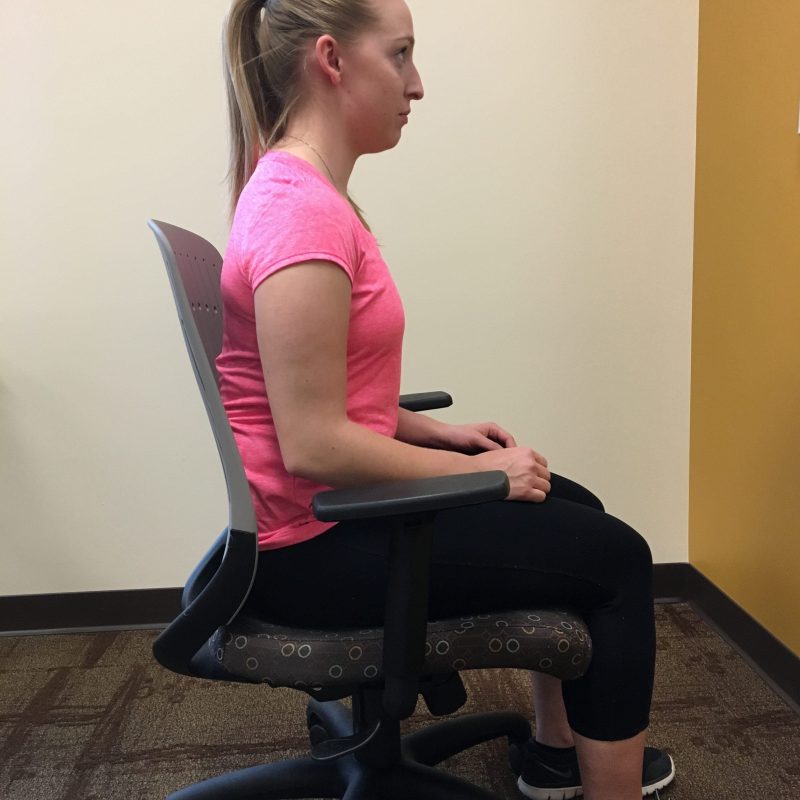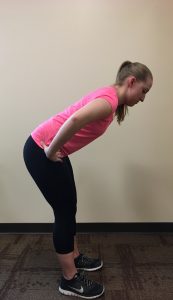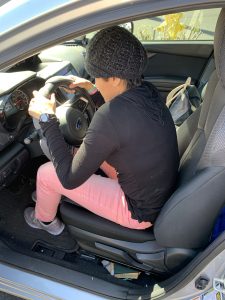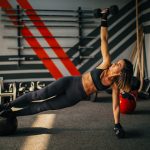
How much does our personal training clients’ posture truly affect back pain? And what do activities of daily life (ADLs) have to do with it?
What is Good Posture?
Posture refers to the delicate balance of bones, muscles, and connective tissues as we stand, sit, and move. Proper posture allows the body to remain in alignment and prevents muscle strain on delicate joints.
Research has discovered that the discomfort and pain one feels from poor posture more directly reflects a lack of movement throughout our daily lives. The muscle tightness experienced from prolonged sitting at a desk job may in fact result in back pain; yet current evidence has convinced experts not to link poor posture with back pain.
Breast Cancer and Posture
In recent years, scientists have made great strides in breast cancer therapy and increased patient longevity. The harsh treatments, however life-saving, can often trigger functional limitations and postural changes. Most patients frequently cite asymmetry of the shoulder girdle and trunk as well as greater forward leaning of the trunk as causing postural challenges.
Such stressors may ultimately lead to joint problems and inadequate muscular tension. Physical therapy, an effective intervention for postural realignment and recovery of functional autonomy, can help guide personal trainers as to gentle and appropriate movements in a gym setting.
As a result of surgery and other treatments, breast cancer patients soften slip into a more sedentary lifestyle, causing weakening of torso muscles. Other studies suggest that, in due to inactivity, the percentage of muscle tissue is lower, thereby causing body postural changes.
Previous research demonstrated that patients who received radiotherapy also reported greater problems with shoulder mobility and higher incidence of lymphedema; both of these may contribute to the development of postural disorders, as patients adopt an improper forward flexion of the trunk.
Armed with such knowledge, personal trainers can focus their energies on these specific aspects of a recovering client’s body. Any postural improvement will not only help physically, but might also go a long was towards improving one’s self-image following breast cancer surgery.
Ever wonder how your personal training clients can twist left one day and all of a sudden they throw their back out? Or raise their hand and “get” frozen shoulder? Or how something as light as a paintbrush can create neck pain? The influence of posture on our clients’ activities of daily living is great enough to either increase ease and enjoyment or cause injury and pain.
Things, like putting on makeup and doing household chores, are referred to as, “Activities of Daily Living” and abbreviated as ADLs (Bureau of Labor and Statistics, 2019). ADLs can be highly repetitive just like fitness movements or specializing in a sport.
Other examples of ADLs are:
- Driving a car
- Eating
- Bathing
- Dressing
- Grooming
- Cooking
- Cleaning
- Reading
- Working puzzles
- Using electronics
- Getting in and out of the car
- Carrying groceries from the car to the home
- Shoveling snow/clearing off the car
The Relationship Between Posture and ADLs
Being mindful of maintaining proper posture while performing ADLs may help prevent overuse injuries (Medline, n.d.). A great example of this is sitting (whether it’s while watching TV, driving a car, using our electronic devices, or reading a book). If sitting in a hunched-over position where the head is leaning forward, the shoulders rounded down, and the thoracic spine is curved into excessive kyphosis, it can contribute to postural distortion known as Upper Crossed Syndrome (Page, Frank, & Lardner, 2010) or more inclusively, Upper Body Dysfunction (Brookbush, 2013).
This is typically characterized by a forward head and rounded shoulders (Page et al., 2010). Consistently looking down at phones and other portable electronic devices can create structural issues, especially in children’s developing bodies.
Another important area that has an impact on posture is the choice of footwear. Wearing high-heeled shoes can lead to the gastrocnemius and soleus muscles tightening (Page, Frank, & Lardner, 2010). The short-term effects of this could be muscle pain, spasms, and leg cramps. The long-term ramifications of this could be the development of postural distortions, low back pain, and issues in other areas of the body such as the knees and hips (Page, et al., 2010).
There is also the repetitive motion of overhead household tasks like painting, changing light bulbs, or dusting picture frames and window sills. These could impact the global shoulder muscles like latissimus dorsi and upper trapezius muscle as well as the stabilizing muscles of the rotator cuff.
 A few other examples of posture-sensitive ADLs would be gardening and weeding. Performing these without keeping proper body alignment in mind, could spell disaster for the lower back and even knees.
A few other examples of posture-sensitive ADLs would be gardening and weeding. Performing these without keeping proper body alignment in mind, could spell disaster for the lower back and even knees.
Training Clients for Posture and Activities of Daily Life
How is this relevant to personal trainers working with clients? By creating exercise programs that support proper posture and alignment.
Choosing stretches and inhibitory techniques that address tight muscles while strengthening opposing muscle groups is the best formula to achieve balance and ideal posture. If we know our clients wear high heels and have tight calves, we can address that through SMR foam rolling followed by stretch protocols.
Most importantly, we can educate our clients on maintaining proper posture during everyday activities. Even if clients train with us 2-3 days per week, they will spend exponentially more time during the week on ADLs. To maximize our results on the fitness floor, they should try to be aware and adjust their postures throughout the week.
Here, the subjective assessment portion of the Par-Q can come in handy, too. Not only can we technically program to support ADLs, but we can also be aware of what activities our clients like to do and program functional movements to support these activities.
To take it one step further, we as fitness professionals can be mindful of maintaining our own proper alignment and posture when we are training and spotting our clients. If we ourselves are hunched over our clients while they do crunches or are not using proper biomechanics to support our clients as they strength train heavy weights, we could be risking overuse injuries from our profession.
Proper posture and ergonomics by no means are bulletproof methods against injury prevention. Yet, it is a critical piece to allowing ourselves and our clients’ optimal movement patterning so that we can continue to perform ADLs injury-free.
Getting Specific
Improvements in everyday posture come from focusing on exercises that strengthen the core — the abdominal and lower back muscles that connect to your spine and pelvis.
Some of these muscles work through spinal flexion, extension or rotation, while others stabilize the pelvis and spine in a neutral position. By targeting the entire core with slow, controlled movements, clients can achieve the most success.
The term “neutral spine” describes the position that provides the least physical stress for the spine when sitting, standing, lifting, and moving through daily life. Maintaining this position during exercise will not compromise the natural curve of the spine and should feel comfortable.
Personal trainers may choose to cue clients with the following instructions:
- feet shoulder-width apart
- knees slightly bent over the ankles
- hips over the knees
- shoulder back
- head forward
Suggested Exercises
Below we offer just a few of the more common exercises trainers can easily incorporate into a client’s regular workout program to strengthen the core and improve posture, especially for activities of daily life:
Core Stabilizer: The Hover
- Starting Position: On hands and knees, ensure that the hands are directly below the shoulders and knees directly beneath hips.
- The Move: Inhale through the nose, then exhale, drawing navel in toward spine while lifting the knees just an inch off the ground. Watch the client’s spine for caving. Hold for 3 to 10 seconds, depending on clients’ control of spinal stability. Return to the floor and rest for 5 seconds. Repeat 5 more times.
The New Crunch
- Starting Position: Lie on flat back with knees bent and feet flat on the floor. Press the lower back into the floor. Place your hands behind your head, or reach your arms toward your knees if it doesn’t create too much tension in your neck.
- The Move: With hands behind the head, exhale strongly while drawing navel in toward spine. Curl head and shoulders slowly off the floor. Hold 3-5 seconds, then slowly lower. Repeat ten times.

The Hinge
- Starting position: Stand tall with hands on hips, back neutral, core engaged, feet hip-width apart.
- The move: Hinge forward at the hip while inhaling and maintaining a perfectly neutral spine with navel pulled in. Descend only to 45 degrees, then exhale back to start. The body should remain in two stable segments: Hip to head, hip to foot. If the client has a difficult time maintaining a neutral spine, use a dowel rod or a broomstick and have them hold it against the back with head and butt remaining in contact with the dowel throughout the movement.
Cobra Pose: Back Extension
- Starting Position: Lie on stomach, arms at sides and palms flat on the floor. Extend legs straight back, pressing tops of feet into the floor.
- The Move: Exhale strongly while pulling abdominal muscles in and up toward the spine. Lengthen through the spine and slowly raise head and chest off the floor, using only the muscles in the back. Refrain from pushing down into arms to press up. Keep pelvic bones on the floor, and gaze down at the floor to keep the neck muscles at ease. Slowly lower back down. Repeat three to five times, adding more as lower back gets stronger.
Plank Pose
- Starting Position: Begin on hands and knees, palms under shoulders. Extend both legs straight back with toes tucked under, into a “push-up” position. Draw in the abdominal muscles to prevent a “sway back,” and maintain eye contact with the floor.
- The Move: Hold the plank until your fatigue compromises form. Rest and repeat.
The Sitting Trap
One of the most common “activities” of daily life is unfortunately not an activity at all. When you drive a car or sit too long, there’s a big chance of developing postural distortions or compensatory body patterning, especially if the individual slouches or the vehicle seating is not ideal for the driver/passenger’s body.
The most common postural distortions are Upper Body Dysfunction, Lower Extremity Dysfunction, and Lumbo Pelvic Hip Complex Dysfunction, each of which can manifest in the constant driver.
Staff writer, NFPT-CPT, and health pro extraordinaire Shay Vasudeva teamed up with Dr. Ben Zorensky, a Naturopathic Physician and Certified Yoga Instructor to explain what happens to the hip flexors and lumbar spine when we sit too long or with poor posture when driving a car:
Like Dr. Ben said, sitting too long while slouching can put pressure on the lumbar spine, tightening its supporting and stabilizing musculature, and shortening the hip flexor muscles. But the effects don’t stop there. Everything in the body is connected!
In essence, there’s a cascading effect of poor sitting posture while driving a car down to the ankles, which Dr. Ben talks about too, when it comes to dorsiflexion and plantar flexion of the foot, even tibial internal rotation which is associated with overpronation (think about pivoting your foot from the gas to the brake pedal). Some may also tend towards tibial external rotation if that’s the tendency, exacerbating oversupination. Moving up the body, poor sitting posture impacts the shoulder and neck also.
I also like to call this becoming a “human cashew”.
Don’t be a cashew! Better yet, DON’T BECOME A CASHEW!



They’re tasty, but here’s a Yoga exercise that can help correct or adjust the musculature from poor sitting posture while driving:
Warning Against Imbalanced Workouts
While exercise ranks as one of the best ways to maintain a healthy body and spine, some recreational athletes train select muscle groups excessively while neglecting others. If a training protocol emphasizes chest exercises but fails to work the upper back, a rounded-shoulder issue may arise.
While flexing the trunk places additional stress on the erector muscles in the back, engaging the glutes and hamstrings with a hip hinge proves beneficial since these muscles are stronger. The hip hinge not only protects the back from injury, but also strengthens the glutes and hamstrings to further improve this movement and other lifts.
Developing a balanced workout program for clients allows them to effectively exercise all the major muscle groups. In some cases, personal trainers will include strengthening exercises and stretches to address overlooked muscle groups like the core, hips, and lower back.
Lifting
Improper lifting poses one of the most dangerous threats to the back. When lifting weights or heavy objects in their daily lives, remind clients to go through this mental checklist of body positioning:
- Stand close to the object being lifted.
- Spread feet apart (or stagger them, if appropriate).
- Squat down, keeping feet flat on the floor, using knees and hips maintaining neutral spine.
- Engage abdominal muscles.
- Lift using the work of leg muscles instead of back muscles.
Posture While Sitting
Activities of daily life play a key role in spine health. Unfortunately, hours spent at a sedentary job, computer gaming, and an inactive lifestyle can all contribute to chronic back pain.
Slouching, perhaps the major posture culprit, involves leaning backward too much while in a seated position. Such misalignment increases tension on the muscles, which may lead to lower back pain.
A key to alleviating slouching involves placing a chair at an appropriate height. When hips and knees rest at a 90-degree angle, the body experiences much reduced spinal forward flexion, which often contributes to herniated discs or disc degeneration.
While seated at a computer, ensure that the monitor hits right at eye level. A monitor mounted too high leads the neck to extend upward, causing compression on the cervical joints and ultimately muscle strain. Conversely, looking down at a computer screen promotes the aforementioned slouching.
Prevention in Activities of Daily Life
Since clients spend the majority of their time away from the gym, trainers can offer tips to guide them towards a healthier lifestyle. Consider the following:
- When pushing objects like lawnmowers, maintain flexed arms, a staggered stance, and legs underneath the body.
- When pulling objects like strollers or wagons, grasp the object with palms upward, lean bodyweight backward and maintain a neutral spine.
- When lifting objects like laundry baskets, follow the aforementioned 5-step lifting protocol.
- When performing standing activities like washing dishes, maintain a neutral spine throughout and periodically shift weight back and forth between feet.
Posture-Correction Devices
Most simple posture-correcting devices vary in nature from a brace or bra or a shirt that pulls the neck/back/shoulders into a more upright alignment. Many claim to retrain muscle memory, provide energy, or relieve pain caused by bad posture.
The results of a 2019 study published in the Scandinavian Journal of Pain revealed that while posture-correcting shirts do indeed alter one’s posture, the study was fraught with problems. According to J.P. Caneiro, a physiotherapist and research fellow at Curtin University in Perth, Australia, and one of the review’s authors, pointed out that the subjects using the posture correctors exhibited no discomfort prior to the study.
Thus, Caneiro concluded that “…there’s not enough good evidence to support recommending posture-correcting shirts, especially as a management strategy for musculoskeletal pain.”
Consider Underlying Causes of Poor Posture
Eugene Wai, a spine surgeon and associate professor in orthopedic surgery at the University of Ottawa, points out another potential flaw associated with physical posture braces. For individuals dealing with back pain, he feels the problem lies more with muscle weakness and strain than simply posture.
With a brace, Wai says, “…the danger is that people would maybe develop a dependence on it, and then actually that might lead to worsening of the weakness.”
One benefit of note, according to some research, relates to the user’s mood. Evidence shows that poor can indicate a poor mood, and can often help professionals diagnose depression. Another study indicates that the inverse relationship exists: adopting more upright postures might actually help improve mood.
Overall, posture correctors ought not to serve as a long-term solution for poor posture. Temporarily alleviating pain fails to address the root cause of the problem.
How to Conceptualize Good Posture in Activities of Daily Life
The above is all great advice in theory but how can you as a personal trainer convey the gravity of the influence of ADL’s in your clients’ lives?
While training clients, make a direct correlation to the movement you are guiding and how it will mimic something they do in real life. A deadlift is, for instance, the proper way to live something heavy from the floor, When they are deadlifting tell them to imagine it is their grandbaby or a UPS delivery.
When conversing casually with your client, note if their shoulders elevate or if they shift their hips and feet to one side. Gently bring this to their awareness; tap their shoulder and say relax, or tell them to look down at their hips and feet. Most of what we do improperly is unconscious. If you don’t help your clients become aware of these dysfunctions while you’re with them, they may never know!
If they have a partner or housemates, tell them to recruit their help as well! Once they know their body’s unconscious predilections, they can have their family members alert them just as you do when they are falling into undesirable postures.
In what ways have you made an effort to support your clients’ posture and everyday activities?
Learn more in our Functional Training Specialist as a part of our Continuing Education Course Series.

References:
brookbushinstitute.com/article/upper-body-dysfunction-ubd
Page, P., Frank, C. C., & Lardner, R. (2010). Assessment and treatment of muscle imbalance: The Janda approach. Champaign, IL: Human Kinetics.
Bureau of Labor and Statistics. (2019, June 19). Average hours per day spent in primary activities for the civilian population, 2018 quarterly and annual averages. Retrieved from: https://www.bls.gov/news.release/atus.t12.htm
https://www.webmd.com/fitness-exercise/better-posture-exercises
https://chatswoodchiropractic.com.au/does-a-posture-corrector-work/#:~:text=The%20short%20answer%20is%20that,not%20a%20long%2Dterm%20solution.
https://www.washingtonpost.com/wellness/2023/07/17/posture-devices-back-pain/
https://www.kineed.org/wp-content/uploads/2020/01/Thorvaldur-Skuli-Palsson-paper.pdf
https://www.sciencedirect.com/science/article/pii/S0001691821001037#bb0020
https://www.ncbi.nlm.nih.gov/pmc/articles/PMC3646325/
https://www.graphyonline.com/archives/IJPTR/2019/IJPTR-152/#:~:text=The%20treatment%20of%20breast%20cancer,major%20expected%20changes%20in%20posture.
https://www.ncbi.nlm.nih.gov/pmc/articles/PMC8036801/#:~:text=Previous%20studies%20have%20demonstrated%20that,greater%20forward%20trunk%20inclination%2C%20more






